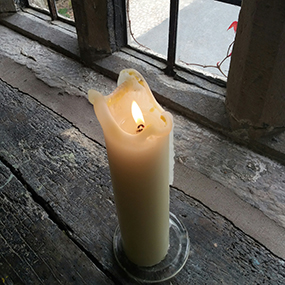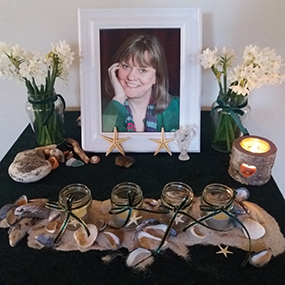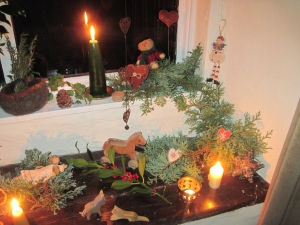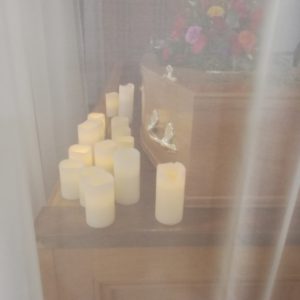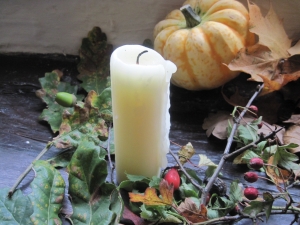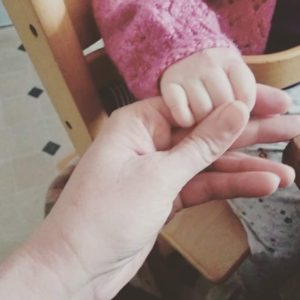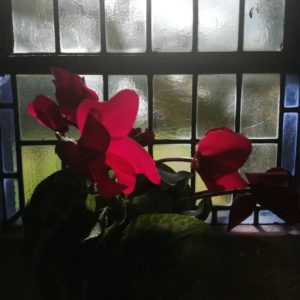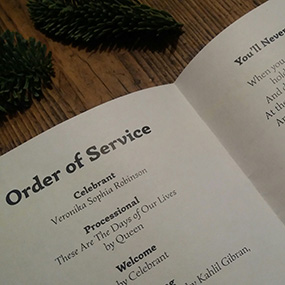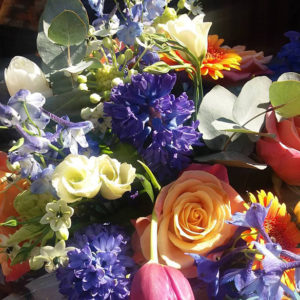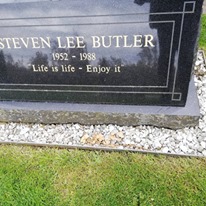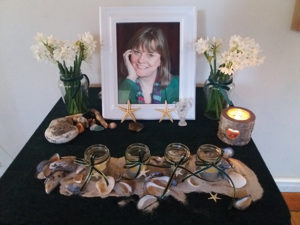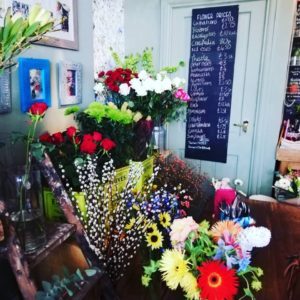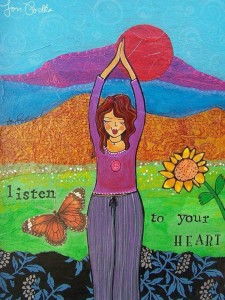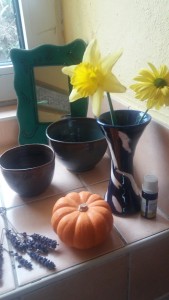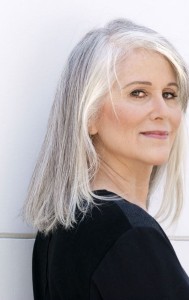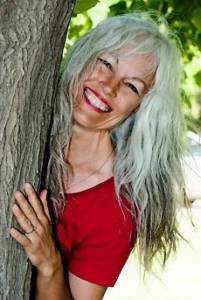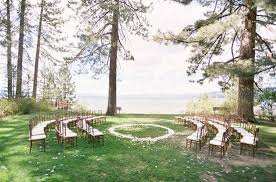Grief, Gluttony, Giving, Gratitude. Our experience of Christmas tends to fall into one or two of those areas.
Christmas has always been a cherished time in my life, made magical by parents who brought the festive season alive with enchantment and mystery. The Germanic tradition my parents passed onto me is something I still honour. And so, I celebrate on Christmas Eve by candlelight with a lovingly prepared meal and gentle time with my loved ones. This, to me, is Christmas. It’s based on simplicity, love, beauty, and kindness.
As children we would gather by the tree (one grown on our land), the scent of pine infusing the room as we sang Christmas songs in both German and English. To celebrate Christmas was to cross the threshold into another world: it was, indeed, ceremonial, and imbued with ritual, magic and love. I’ve always adored Christmas for its ability to bring heightened beauty into my life.
Carrying this beacon from my mother to my own children was no easy task. I’m not sure I ever managed to carry it off, but I will always cherish the years that my daughters were part of this season. I remember their sweet little faces as they sang songs, played instruments; and, as they grew older, their place alongside me in the kitchen preparing the celebratory food. There was nowhere in the world that I wanted to be other than with my little family all safe and happy under one roof. The whole of December was one long festive cheer. The fact my Christmas CD collection is disproportionately huge compared to any other type of music, is evidence of that. Those days are gone. Family Christmases are lost forever.
The Grief-riddled Christmas
Over the years, I’ve invited people who’ve been on their own to spend it with me (firstly, when I was single) and then later, when I had my own family. One of those people was my dearest friend Pam. She hated Christmas. Her dad had died the week before Christmas, when she was just ten years old. As you can imagine, it had a life-long impact. Over the years, she’d come and be a valued part of our family celebrations. I always hoped that by having her share Christmas, it might help to disrupt the script she had of it being a hated event. I was wrong. Christmas Day 2016: She hung herself with the dog lead. There’s no nice was of framing that event. That’s the reality of it. Here one minute. Gone the next.
There’s a level of grief that will inevitably permeate every Christmas I experience from here on in (no matter how optimistic or determined I am to free myself from that weight). I alternate between missing our laughter, shared tears, hugs, long walks, the sharing of rom-coms at the cinema, and someone I could talk to in a way I’d never been able to talk to anyone else and wanting to slap her. I find myself so angry at her level of selfishness. “Christmas day, Pam? Ffs!” And then I remember how much she hated life, and I allow myself to understand. I respect her choice, knowing she’s at peace. Oftentimes, I find myself envying her and that complete freedom she now has from all earthly crud.
Types of grief
Of course, grief isn’t a one size fits all, and there are many types of grief which can riddle the Christmas season.
There can be the death of someone we’ve loved either at Christmas or throughout the year, and the ‘festive’ season being lived without their presence can take its toll. We feel obligated to wear the face of ‘good cheer’ so as not to ruin Christmas for anyone else, while all the time we just want to scream. We’re forced to suppress our grief.
There can be the death of family life as we’ve known it, either by circumstance (kids or parents moving far away), estrangement, or with them just being unavailable due to other commitments.
For those of a more sensitive, highly empathic, humanitarian disposition, world grief can bite at the heels causing us ongoing torment. How can we have all this greed and gluttony in our faces while people around the world are starving, in war zones, having homes burnt down, stuck in prisons, or enduring the violation of their human rights. Knowing there are people sleeping rough on the streets or others who’ve gone missing, animal cruelty, and so on, can take its toll on our wellbeing. That they are strangers, makes no less an impact than if we knew them personally. Our culture doesn’t offer support for those who feel this pain acutely. Serving up a festive meal and ensuring everyone has gifts and been sent a card can feel numbing and utterly pointless when the world is falling apart.
We may experience grief when our home has been taken from us in some way, through flood, fire, violation or even because a loved one has died there. Home is meant to be our sacred space, our safe place in this world. If you like, it’s our second skin. When that’s peeled from us, we’re more vulnerable than ever. Where do we go? How can we create a sense of safety in our life?
Maybe we are grieving our health, knowing illness is taking its hold and that our days or months on earth are few. Perhaps it’s amplified by unhealed rifts with friends or family.
Perhaps we’re grieving the loss of employment or other ways we identify ourselves or measure our value.
It could be that we’re grieving the permanent loss of a relationship: friendship, partner or child.
These forms of silent grief don’t have a funeral. There’s no one to pat us on the shoulder and say “I’m sorry for your pain.”
Grief may show up in the form of existential questioning. “Why am I here?” “What’s the purpose of life?” “Why do I have a charmed life while that person is on the streets?” Or maybe it’s “Why is my life so shit?” This can be as isolating as any other grief, and just as misunderstood. Like other forms of grief, there are no answers.
Grief, like water, is difficult to contain; always finding a way to seep through any available space. We use funerals to publicly share our grief, if only for a half hour or so. Mourning has no timeline. It doesn’t conform to trends, habit or belief systems. It is almost unidentifiable because it is unique to each person. No one can ever understand the landscape of our grief. For the most part, grief is an invisible parasite sometimes feasting and other times resting. All we know is that we aren’t in control of how it will behave at any given moment.
Of course, we don’t need the Christmas season to bring up all the variations of grief, but the expectation of festivity and good cheer is so mired in our cultural soup that it only heightens anything unlike itself.
Gluttony
Yesterday I popped out to the shop to get a red cabbage and Brussels sprouts for Christmas Eve dinner. The queues were eye watering and glacially slow but not nearly as much as the over-laden trolleys. The anger and bickering between couples and families as they fought their way through the jungle of Tesco, only highlighted just how far removed we are (culturally) from the point of Christmas. Even if the ‘cute baby Jesus story’ isn’t our thing, surely the reason for the season is actually about expressing love? If not, then WHAT IS IT FOR? Why do we continue to engage in something that seems to cause no end of stress to so many people? Every year, at least a dozen people will ask me: “Are you ready for Christmas?” That is, have I bought and wrapped loads of presents and stressed myself to the max. My answer is always the same: “I keep Christmas simple, and I don’t get overwhelmed by it.” About the only Christmas card I send now is to my mother. Gifts are for immediate family. It’s not selfish, it’s self aware. I could easily send out hundreds of cards and buy dozens of presents. These things don’t make the world a better place.
Christmas that straddles the terrain of crass commercialisation and the keeping up of appearances can only end up producing emptiness. A beautiful Christmas isn’t dependent on excess, greed, and over consumption (food, alcohol or presents). Giving isn’t determined by bank balance or baubles and tinsel.
Do we really need to buy that much food and alcohol for the couple of days that the shops are shut? Do we have to send Christmas cards to everyone we know? As with most things in life, if we’re always motivated or hindered by ‘but what will they think?’ it means we’re not being true to our self.
Giving
To give from the heart is to give of ourselves. In a world that’s riddled with pain, we can weave our way gently by touching others with sincerity and kindness. Even the smallest action can make a difference. Donating or volunteering to food banks, gifting to homeless shelters, visiting elderly people in a hospice who have no family, smiling at a stranger on the street, taking time to say to the person on the check out in hell city (supermarket), “I appreciate what you’re doing, and I hope you have a peaceful Christmas,” (ditto the people cleaning public loos) or checking on someone who has been bereaved – these acts of giving help to create a new world: a place that’s kinder and more gentle.
Gratitude
Gratitude is quite possibly the highest level of vibration that exists. The simplicity of just ‘being’ allows us to step beyond all cultural expectations and to be ourselves, grateful for our place in the world. Whether it’s from the perspective of ‘there, but for the grace of the Universe, go I,” or recognising that we could have been born into a different body, family, country, custom, religion or culture, and that where we are now is okay.
Do we have a roof over our head?
Do we have a meal to eat?
Do we have someone (no matter where they are geographically) we care for and who cares about us?
If we have these basics, is there a way we can share some of the good we have?
If we don’t have these, is there a way we can ask for what we need?
There will always be people with more or less than we have, physically, mentally, emotionally and spiritually. In the words of the late Ram Dass, “We’re all just walking each other home”.
If that’s true (and I have no reason to doubt it), then what can we do to help each other enjoy that journey? Surely that’s the meaning of Christmas, and every other day of the blessed year.

